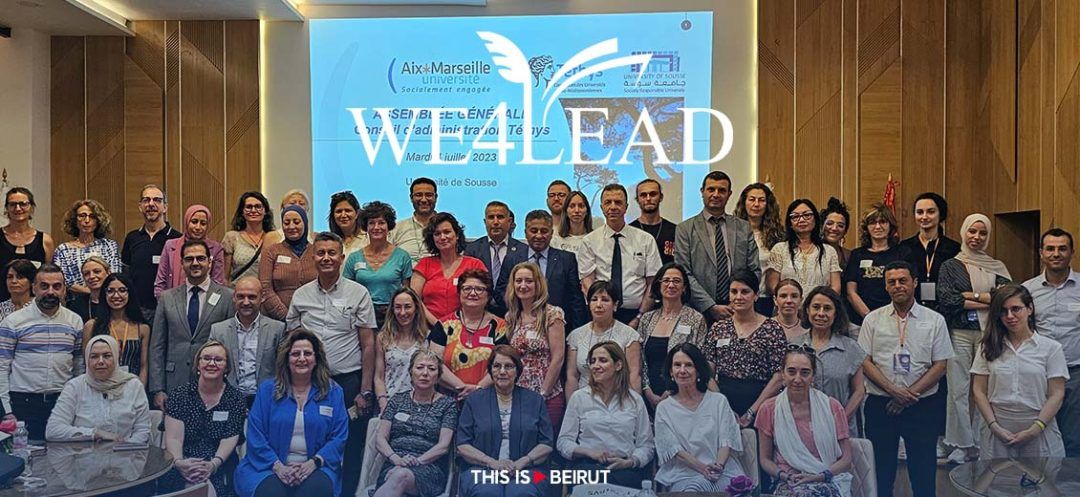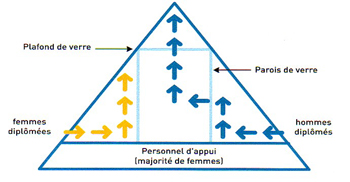
©Coordination meeting held in July 2023 in Sousse, Tunisia. (We4Lead official website)
Women’s Empowerment for LEADership and Equity in Higher Education Institutions (WE4LEAD) is a project co-funded by the European Union that aims to promote equal access for women to the highest leadership positions in higher education institutions around the Mediterranean region.
Bringing together nine universities from the Mediterranean region, including the Lebanese University and the Antonine University in Lebanon, the WE4LEAD project (Women's Empowerment For LEADership and Equity in Higher Education Institutions) has a long-term goal of transforming the governance of higher education institutions by promoting and adopting a culture of gender equality. In practical terms, the project seeks to assess gender inequalities and increase the number of women in key positions.
This initiative might seem too ambitious. But in societies that remain patriarchal and especially considering the Lebanese context, it is crucial.
A Glass Ceiling
Upon closely examining the landscape of university institutions, it becomes starkly clear that women fill the majority of teaching and administrative roles. However, their presence steadily diminishes as one progresses through the institutional hierarchy (dean, department head, laboratory director, professor, etc.). At the top of this pyramid, women are extremely scarce and almost completely absent.
"This phenomenon is described as a glass ceiling that women struggle to break through in order to reach leadership positions," Huguette Abou Mrad, Director of the Language Office at Antonine University (AU) and WE4LEAD coordinator, explains to This Is Beirut.
 This diagram outlines the career progression of male and female graduates within the same academic environment (Source: RSEnews).
This diagram outlines the career progression of male and female graduates within the same academic environment (Source: RSEnews).Currently in Lebanon, few women hold leadership positions in universities. Nada Moghaizel-Nasr, the Rector's Delegate for Quality Assurance and University Pedagogy at Saint-Joseph University, and Étienne Harb, Vice-Rector for Research and Development at La Sagesse University, are among them. It should be mentioned that Lara Karam Boustany was the first woman to hold the position of Rector from 2020 to 2023 at La Sagesse University.
In this context, it can be asserted that the problem primarily lies in the recruitment process, where women face discrimination.
"In a scenario with two candidates who have similar skills and qualifications, a panel that included women chose the male candidate," Abou Mrad explains, emphasizing that "women often find themselves constrained by implicit gender bias rooted in social and cultural conditioning."
On the other hand, “Recruiters are not always aware of the inequalities present in their institutions,” Abou Mrad adds, “hence the need to bring about change in institutional policies." She explains that AU is already committed to a gender equality policy within its various departments.
“The WE4LEAD project is a long-term and large-scale project, but we are determined to see it through to the end to achieve the set goals," she says eagerly.
The partners involved in this initiative are driven by unwavering commitment and boundless motivation. "We can't wait for global peace to tackle a project or address a social or academic issue. Progress happens gradually, and determination is what matters," asserts Selim Makdessi, Dean of the Faculty of Economic and Management Sciences at the Lebanese University (LU) and co-leader of the WE4LEAD coordination team. Optimistic, he confirms to This Is Beirut that "LU has the institutional will to bring about significant change, despite the challenges inherent in a public institution, especially in a risk-laden country like Lebanon."
A Global Initiative
Under the coordination of Aix-Marseille University, co-managed by LU and financed by the European Union (EU) with a grant of nearly 800 thousand euros, WE4LEAD was inaugurated on March 1, 2023 for a three-year duration. It falls within the Erasmus+ framework, the EU program for education, training, youth and sports, dedicated to enhancing capacities in higher education.
The partners include Antonine University in Lebanon, Tunis el-Manar and Sousse universities in Tunisia, Constantine and Mostaganem universities in Algeria, the Autonomous University of Madrid and Sapienza University in Rome.
The Francophone Network of Women Leaders in Higher Education and Research (RÉSUFF) is an associative partner that contributes to the project through networking and outreach efforts. Leila Saade, President of RÉSUFF's Scientific Committee, shares with This Is Beirut that "collaboration within WE4LEAD happened organically, as the network shares the same goals as this project and is dedicated to advancing gender parity in academic institutions."
Launched in 2015 under the auspices of the Agence universitaire de la Francophonie (AUF), RÉSUFF now boasts 90 institutional, associative and individual members. "Intricately linked to around a thousand institutions within the AUF university network, it plays a pivotal role in spreading the outcomes of the WE4LEAD project," Saade explains.
In this regard, Makdessi believes that "having LU, the only public institution in Lebanon, participate in the international management of WE4LEAD contributes to shaping institutional culture beyond the academic realm." He adds, "Promoting gender equality within educational institutions would influence other sectors, contributing to changing perceptions about the role of women in society."
A Rigorous Schedule
Based on data collected from various countries, WE4LEAD puts forth eight work packages, distributed according to a schedule that outlines the outcomes to be presented at each stage of the journey.
Among the activities to be carried out in this framework are a series of training sessions on various topics, including gender and leadership, recruitment and promotion without gender stereotypes and sexual harassment.
A crucial task within the project involves setting up a "parity unit" within each institution. This entity is responsible for identifying signs of gender inequality and ensuring the establishment of a lasting culture of parity.
Additionally, the drafting guide for an equality plan, a mission jointly undertaken by AU and Sapienza University of Rome, aims to formulate a recruitment process that mitigates the impact of implicit gender bias.
Every task undergoes scrutiny from a quality assurance committee that includes members from partner universities. This committee offers feedback on the completed task, fostering discussions on potential adjustments and enhancements.
It's a collaborative effort, and we'll be eagerly tracking its evolution!
To find out more and follow the project's progress until 2026, visit the official website: http://we4lead.ul.edu.lb/
Read more



Comments